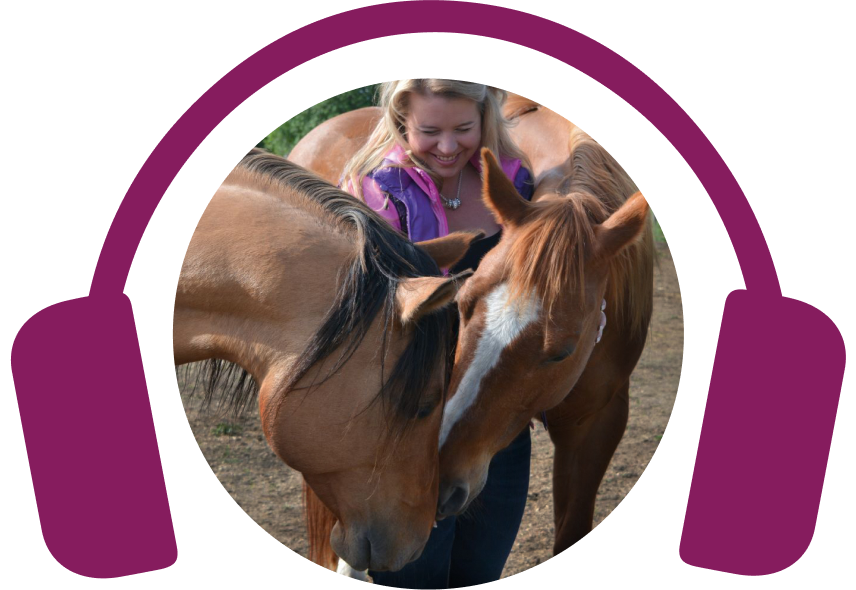Elisha’s Podcast
ELISHA’S PODCAST

Ready to get your horses on the path to better health?
This podcast was created to do just that.
Tune in to get new insights, perspectives, horse health tips, and real-life horse healing stories.
Take what you learn and apply it to your horse TODAY.

One Conversation at a time
From learning what to feed your horse and how to use nutrition effectively, to practicing prevention and approaching specific health challenges naturally, to just bringing your horse more joy and better health…
I’ve got you covered!

Check out my recent episodes
I am excited to welcome Jessica Fobert as my guest today! Over the past decade, Jessica and I have worked together on many challenging cases, and I have come to value her input as a trusted second opinion for my clients. She is a hoof care practitioner and lifelong horse lover, registered with both the Canadian Equine Hoof Care Association and Progressive Hoof Care Practitioners. She and her business partner, Natalie, run a rehab facility in Toddham, Ontario, where they take on the toughest of cases. Join us as Jessica dives into the critical work she does at the rehab, debunking common trimming myths and highlighting the crucial importance of proper hoof care. Many Cases Go Undiagnosed Owners and professionals alike should be vigilant and proactive, as subclinical laminitis often goes unnoticed. Many horses can have inflammation without full-blown laminitic episodes, and even minor hoof distortion, recurring abscesses, or poor posture may be early signs. Inflammation Hoof inflammation starts before any rotation or visible damage occurs. It typically results from systemic stress, poor nutrition, or mechanical imbalance. While X-rays may not reveal early changes, heat, soreness, gait alterations, or behavioral changes can indicate trouble brewing inside the foot. Movement and Circulation Stabling a sore horse may seem protective, but confinement reduces circulation and delays healing. Movement is crucial to restoring hoof health. Gentle, controlled exercise within the comfort zone of the horse, often with the help of boots, can significantly improve blood flow and tissue regeneration. Boots Boots help reduce inflammation and promote healing, allowing sore horses to move more comfortably. However, they are not a permanent solution. Avoid Over-trimming Trimming should preserve the sole and reduce leverage without forcing the foot into an artificial shape. Over-trimming or removing too much sole worsens instability. Be Cautious with Certain Treatments Corrosive thrush treatments may kill bacteria but can also damage live tissue, making reinfection more likely. Non-corrosive antimicrobials can restore microbial balance without damaging sensitive tissue, soothing the foot, and helping to reset its microbial environment. Consistency and gentle application are the key. Gut Health Thrush and white line disease can recur when gut health is compromised. High-sugar, high-starch diets fuel inflammation and weaken hoof tissue from the inside. Horses fed low-NSC diets will often show rapid hoof improvement. In some cases, long-standing issues like contracted heels and white line disease will resolve completely within months of a diet change. Lasting Change Lasting hoof changes must be supported from the inside, as no trim can undo the effects of a poor diet. Contracted heels, long toes, and weak hoof structures are often diet-driven. Even horses that have been trimmed carefully for years may not improve until their processed feeds get replaced with low-sugar alternatives. The Power of Movement Movement is essential for healing hooves. Even sore horses should be allowed to move freely within their comfort range. Boots can encourage movement, reducing pain and enabling gradual increases in circulation and use. Metal Shoes Metal shoes may provide instant relief for some horses. However, they increase concussion and vibration, which can worsen laminitic damage over time. Whenever possible, barefoot is ideal, but there are situations where temporary shoeing provides a helpful bridge. Euthanasia Is a Complex Decision For owners facing the possibility of euthanasia due to chronic laminitis, the most important factors to consider are quality of life, age, and the extent of internal damage. A younger horse with good overall health and minor pathology may fully recover with time, while an older horse with extensive remodeling and no progress after months of care may not. It is not about how long you have been trying. It is about whether or not progress is still possible. There Is Hope with the Right Support Horses can recover from severe laminitis. Even cases that seem hopeless can recover with the right support. A strong rehab plan includes proper trimming, pain relief, an appropriate diet, and enough movement. If the damage is not too severe and the blood supply remains intact, healing can be dramatic. Owner Education Makes a Difference Owners who understand hoof anatomy, inflammation, and the impact of diet are better prepared to advocate for their horses. A good support team includes trimmers, veterinarians, and professionals who collaborate and communicate openly. Expert Help Is Available Jessica Foutbear offers remote consultations, ranging from quick second opinions to in-depth assessments and trim guidance. She also teaches clinics and workshops. You can reach out to her via email or on social media. Links and resources: Connect with Elisha Edwards on her website Join my email list to be notified about new podcast releases and upcoming webinars. Free Webinar Masterclass: Four Steps to Solving Equine Metabolic Syndrome Naturally Register for my self-paced course, Resolving Equine Metabolic Syndrome Naturally. Contact Jessica Fobert On social media: @BarefootHorseCanada Email: Jess.fobert@gmail.com This week, we explore some key contributors to laminitis, other than grass, that every horse owner should be aware of. In the last episode, we discussed sugar-induced laminitis and why spring grass can be a big concern for many horse owners. However, sugar is not the only factor that can trigger laminitis, and owners need to understand the broader range of potential causes. A Whole-Body Issue Laminitis is inflammation of the lamina. It is often a reflection of systemic inflammation and not just a foot problem. Inflammation, especially when chronic, can damage tissues and affect many parts of the body before appearing in the hooves. Laminitis is often a symptom of deeper, unresolved health issues. Stress and Emotional Triggers Stress is the primary cause of inflammation in horses. Emotional stress resulting from the loss of a pasture mate, a new environment, or changes in the herd can lead to laminitic episodes. Chronic stress raises cortisol, increases blood sugar, and suppresses the immune system, which is particularly dangerous for insulin-resistant horses. Supporting horses through emotional changes and acknowledging their grief is essential, as horses feel things deeply, and unaddressed stress can lead to significant health issues. The Role of Gut Toxicity Gut health links closely to laminitis, especially in horses with insulin resistance or metabolic syndrome. A compromised gut, often caused by poor diet or chronic inflammation, can lead to a leaky gut, which allows toxins to enter the bloodstream, creating systemic inflammation. Removing inflammatory ingredients such as processed feeds, preservatives, and vegetable oils from the diet can significantly improve hoof health. Owners should look for food sensitivities, even to common ingredients like flax, and consider rotating feeds and supplements to reduce the risk of intolerance. Hidden Causes in the Diet Some horses are more sensitive to ingredients than others. So, an ingredient that is safe for most horses might be causing your horse inflammation. If your horse is not improving despite a low-sugar diet, look at everything it eats. Supplements cannot offset food intolerances. So, if your horse is reacting to something in its diet, the only solution is to remove that item. Medication, Liver Load, and Toxicity Long-term use of medications, exposure to chemicals, commercial feeds, and over-vaccination can compromise liver function. When the liver becomes overwhelmed, toxins tend to build up, and the immune system responds with inflammation. To reduce the inflammation, focus on supporting detoxification and reducing the overall toxic load. Chronic inflammation can lead to further issues like Cushing’s disease if not addressed early. Vaccination Considerations Vaccines can trigger inflammatory responses, especially in horses already dealing with laminitis or metabolic challenges. Inflammation from vaccines may not appear immediately, but it can cause issues in the weeks that follow. For sensitive horses, particularly those with compromised immune systems or high toxicity levels, vaccinations should be approached with care. Work with your vet to determine what is necessary, how to support your horse through the process, and when it might be best to delay or avoid certain vaccines. Final Thought If your horse is struggling with chronic laminitis and nothing seems to help, it may be time to look beyond sugar and hoof care. Evaluate every part of its lifestyle, including emotional health, gut health, diet, medications, and vaccination history. Links and resources: Connect with Elisha Edwards on her website Join my email list to be notified about new podcast releases and upcoming webinars. Free Webinar Masterclass: Four Steps to Solving Equine Metabolic Syndrome Naturally Register for my self-paced course, Resolving Equine Metabolic Syndrome Naturally. Today, we are tackling the topic of laminitis and exploring those early-stage situations where your horse begins to show signs of soreness and tenderness. What we focus on today does not include the more mechanical cases of founder laminitis but rather horses that tend to become sugar-sensitive as the grass begins to turn green in spring. Recognizing Sugar Sensitivity in Horses Some horses become sore or tender as soon as lush spring grass appears. It is often due to sugar sensitivity, and these horses may also be insulin resistant. Insulin resistance can present as swelling in the eyes, sheath, udders, lower limbs, or a general puffiness in the body. It is not always related to obvious hoof problems but often reflects a broader systemic reaction to dietary sugar. Real-Life Example At the facility I manage, several horses broke into a lush pasture and soon showed signs of swelling and tenderness despite us urging them to move. Even horses that were not usually at risk began showing symptoms. That highlighted just how quickly sugar overload can tip the balance and why it is crucial to act early. Step 1: Reduce Sugars The first step in managing sugar-induced laminitis is reducing sugar intake, especially from grass. Some horses can tolerate limited pasture, while others may not. Create dry lots, use fencing or panels to limit access, and have your hay sugar levels analyzed. Watch out for feeds containing molasses, vegetable oils, preservatives, and other additives that may spike insulin and cause inflammation. Step 2: Encourage Movement Exercise is critical. Even when a horse is sore, movement helps lower insulin, burn sugar, and reduce inflammation. It can be as simple as walking, ponying, or hand-jogging. Any movement counts, even 20 extra minutes a few times a week. For horses not currently ridden, gentle groundwork or hand-walking is enough to make a meaningful difference. Step 3: Add Supportive Footwear When Needed Hoof boots with padding can help to relieve pain and make movement possible for horses in extreme pain. Movement is essential for healing, so boots are a helpful short-term solution to get your horse comfortable enough to walk. Creative options, like diapers or duct tape, can also work until you find a better solution. When It Is More Than Just Sugar If you have reduced sugar and increased movement, and your horse is still inflamed or tender, you may be dealing with more than just dietary sugar overload. Persistent fat pads, a crested neck, and excessive thirst and urination can point to deeper insulin resistance. Every Horse is Unique Horses respond differently to diet and management. While some thrive on pasture combined with regular movement, others may continue to struggle, even when their sugar intake gets reduced and they exercise enough. Factors like breed, history, and individual constitution can influence their response. If you are following best practices but not seeing progress, you may need to explore deeper metabolic factors and consider targeted nutritional and organ support. Final Thought The sooner you become aware of early signs of sugar sensitivity and act on them, the better. Reducing sugar, increasing exercise, and providing hoof support when needed can make all the difference. If those measures are not enough, there is still hope, as most horses can regain their balance and comfort with the appropriate nutritional and metabolic support. Links and resources: Connect with Elisha Edwards on her website Join my email list to be notified about new podcast releases and upcoming webinars. Free Webinar Masterclass: Four Steps to Solving Equine Metabolic Syndrome Naturally Register for my self-paced course, Resolving Equine Metabolic Syndrome Naturally.
Meet your host
Hi there, I’m Elisha Edwards

Meet your host
Hi there, I’m Elisha Edwards
I have helped guide thousands of horses back to good health over the years from a variety of different health challenges. And through my courses, webinars, and speaking engagements I educate and empower horse owner’s from around the world to take charge of their horse’s health using the holistic model of health care.
So I know first-hand how difficult and overwhelming it can be to navigate all the different opinions and conflicting information that you come across especially when your horse is faced with a health problem. In many cases, the journey is just as hard on the owners as it is on the horses.
I started Healing Horses with Elisha to guide you, support you, and encourage you through the process of prevention and recovery so you feel good about the decisions you’re making for them.
Here’s what I believe
I have seen countless horses with seemingly impossible health conditions that have been resolved so easily with the right combination of diet, nutrition, and natural remedies. In many cases, it is not the health conditions that prevents the horse from recovering, it is the lack of education, resources, and options that are available.
If the insight and information you gain from this podcast gives you some newfound hope or inspires you to take
a new approach then it has served it’s purpose.
Thank you for giving me the opportunity to help you improve your horse’s health.
Keep listening and learning. Your horse is worth it.
Listen Now
Tune in wherever you listen to your podcasts and follow me so you never miss an episode. I release a new one every Tuesday!

Leave a Review
Reviews help me reach more horses and also help me deliver more relevant content to you!

What my Listeners are saying
“Every time I think there is no way to top what you do – you elevate us to yet another level. I wish I had a fraction of your communication skills. You’re amazing and I am so grateful to be apart of the magic you are creating for horses and their humans.”
Tracey
“Your podcasts are fantastic! I get so excited to listen to the next one. I have 6 geriatric horses and your podcast has really opened my mind to new possibilities in their health and given me the strength to help them through hiccups in their well-being the past few months. I have a nursing education and you explain pathology better than my university professors.”
Sharon
“I can’t thank you enough for the Mindset Tips podcast. I really needed this reminder. It was just what I needed to hear to today.”



